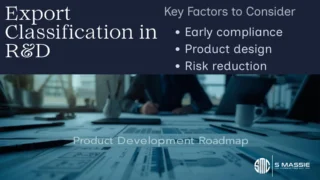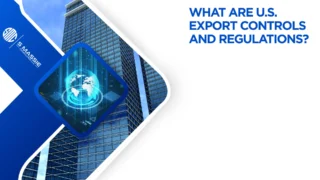Introduction
During times of crisis, the demand for certain goods and technologies may surge, both domestically and internationally. However, strict export controls can hinder the timely delivery of essential supplies to affected regions. To address this challenge, flexible export controls are crucial in enabling the expedited export of critical goods. In addition to flexibility, expediting licenses for humanitarian reasons plays a vital role in ensuring that necessary goods reach those in need without unnecessary delays.
Understanding Export Controls
Export controls, like ITAR and EAR, refer to regulations and policies imposed by governments to restrict or regulate the export of specific items. These controls are in place to protect national security, prevent the proliferation of weapons of mass destruction, and ensure compliance with international agreements. They encompass various types of goods, including sensitive technologies, military equipment, dual-use goods, or strategic resources.
The Need for Flexibility in Export Controls
Rigid export controls can hinder crisis response efforts, as they may delay the export of critical goods and impede the rapid deployment of humanitarian aid. Flexible export controls are necessary to adapt regulations based on the evolving needs of the crisis. By incorporating flexibility into export control frameworks, governments can expedite the export of essential goods while maintaining necessary oversight and security measures.
Benefits of Flexible Export Controls in a Crisis
Rapid Deployment of Critical Goods
Flexible export controls enable the swift export of critical goods to affected regions. By streamlining bureaucratic processes and reducing administrative barriers, governments can ensure that medical supplies, food, and other humanitarian aid reach those in need promptly.
Facilitating International Cooperation
During a crisis, international cooperation is vital. Flexible export controls foster collaboration between countries by facilitating the sharing of resources and expertise. This collaboration ensures a coordinated response and helps meet the humanitarian needs of affected regions effectively.
Maintaining Economic Stability
Flexible export controls strike a balance between supporting affected regions and maintaining the stability of national economies. By carefully managing the export of critical goods, countries can mitigate the adverse economic impact of the crisis while addressing humanitarian needs.
Expediting Licenses for Humanitarian Reasons
Expediting licenses for humanitarian reasons is a critical aspect of flexible export controls. Governments can establish streamlined processes and expedite the approval of licenses for the export of essential goods to support crisis response efforts. By prioritizing humanitarian reasons, authorities can ensure that licenses are granted promptly, allowing for the rapid delivery of vital supplies.
Examples of Expediting Licenses for Humanitarian Reasons
COVID-19 Pandemic
During the COVID-19 pandemic, many countries expedited licenses for the export of medical supplies and equipment. This included personal protective equipment (PPE), ventilators, testing kits, and vaccines. By expediting licenses for humanitarian reasons, governments could meet the global demand for essential healthcare resources and aid in combating the spread of the virus.
Natural Disasters
In the aftermath of natural disasters, such as earthquakes or hurricanes, expediting licenses for humanitarian reasons allows for the quick export of emergency relief supplies. This includes items like food, water, temporary shelters, and medical equipment. By bypassing bureaucratic delays, affected regions can receive the necessary assistance in a timely manner.
Flexible export controls are necessary to adapt regulations based on the evolving needs of the crisis.
Challenges and Considerations
Expediting licenses for humanitarian reasons requires careful consideration of potential challenges. Governments must strike a balance between facilitating the rapid export of goods and maintaining necessary security measures. Key considerations include ensuring proper oversight, preventing the misuse of exports, and collaborating with international partners to prevent hoarding or diversion of critical supplies.
Recommendations for Implementing Flexible Export Controls
To successfully implement flexible export controls and expedite licenses for humanitarian reasons, governments should consider the following recommendations:
Establish Clear Guidelines
Define clear guidelines for granting expedited licenses for humanitarian reasons during a crisis. This includes identifying the types of goods eligible for expedited processing and establishing transparent criteria for approval.
Streamline Approval Processes
Simplify and expedite the approval processes for humanitarian licenses. Governments can implement dedicated channels or platforms for faster processing, ensuring that essential goods reach affected regions promptly.
Strengthen International Collaboration
Enhance international collaboration and information sharing regarding expedited licenses for humanitarian reasons. This can involve establishing coordination mechanisms, sharing best practices, and promoting joint efforts to address crises effectively.
Conclusion
Flexible export controls and the expedited licensing process for humanitarian reasons are essential components of crisis management. By adapting export regulations and streamlining approval processes, governments can ensure the rapid deployment of critical goods during times of crisis. This approach facilitates international cooperation, supports affected regions, and helps mitigate the adverse impact of the crisis. However, careful considerations and coordination are necessary to strike the right balance between crisis response and security measures.
Export controls to restrict international trade have their place, but need to be flexible in times of crisis.
The U.S. Department of Commerce recognizes that there are “substantial and necessary export controls on the Assad Regime” in Syria, which “is subject to comprehensive export controls as part of a broad U.S. government sanctions program. All items, except for most food and medicine require a license for export and reexport to Syria.”
However, due to the devastating earthquake on February 6, 2023, Commerce has just announced they will expedite U.S. export licenses to NGOs and to Türkiye and Syria to aid humanitarian efforts.
“Our hearts go out to the people in Türkiye and Syria,” Sarah Massie, President of S Massie Consulting, expressed. “They need the world’s support right now and we are glad to see the U.S. government implementing this expedited license process.”
When a government is flexible in times of humanitarian crisis, adjusting trade controls has many positive effects:
- Saves Lives: Expediting export licenses for humanitarian purposes can help save lives by ensuring that critical goods and supplies reach people in need as quickly as possible. This can include things like medical equipment, food, and other essential items that can be difficult to obtain in certain regions or during crises.
- Reduces Suffering: When aid is delayed or blocked due to export restrictions, people can suffer needlessly. By expediting export licenses for humanitarian purposes, we can help to reduce the suffering of those who are most vulnerable and in need of assistance.
- Supports Humanitarian Efforts: Humanitarian organizations rely on the ability to transport goods and supplies across borders to reach those in need. When export licenses are expedited, these organizations can more easily access the resources they need to carry out their work, supporting their efforts to provide assistance and care.
- Improves International Relations: Providing expedited export licenses for humanitarian purposes can be seen as a positive gesture by the international community, improving relations between nations and promoting cooperation in times of crisis.
- Demonstrates Compassion and Empathy: Expedited export licenses for humanitarian purposes demonstrate a willingness to prioritize the needs of those who are suffering and in need of help, showing compassion and empathy for people in difficult situations. This can also have a positive impact on public perception and reputation of countries that take such actions.
The expedited licensing process applies to items such as: “heavy equipment, telecommunications hardware and software, portable generators and other power generation equipment, medical devices, water purification and sanitation equipment and shelter materials.”
The BIS Foreign Policy Division stands ready to assist if you have questions about whether an item requires a license, or you need assistance with submitting license applications: (202) 482-4252 or Foreign.Policy@bis.doc.gov.
Contact us to schedule a consultation or compliance review.






